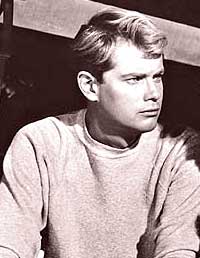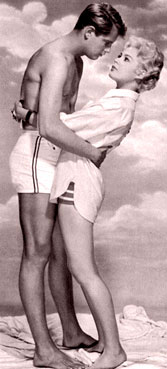
![]()
www.peacockepress.com

TROY DONAHUE: SERIOUSLY COOL
August 2003
 ANDY WARHOL IMMORTALIZED him in art. Liza Minnelli called him a "real looker". Suzanne Pleshette married him in real life and Sandra Dee tried to wed him on screen. Connie Stevens stood by him to the end. He was "a Technicolor movie star", said his Cry-Baby director John Waters. He was "my heartthrob", whispered a nurse as he lay dying in St Johns Hospital, Santa Monica, in September 2001.
ANDY WARHOL IMMORTALIZED him in art. Liza Minnelli called him a "real looker". Suzanne Pleshette married him in real life and Sandra Dee tried to wed him on screen. Connie Stevens stood by him to the end. He was "a Technicolor movie star", said his Cry-Baby director John Waters. He was "my heartthrob", whispered a nurse as he lay dying in St Johns Hospital, Santa Monica, in September 2001.
Troy Donahue. He loved life, he loved women (sometimes too much, he told People magazine in the '80s), and he loved his Harley, said family friend Bob Palmer in 2001. He "wore life like a loose garment [and] was cool because he didn't take himself too seriously".
The son of a General Motors executive and an aspiring stage actress, Troy was born Merle Johnson Jr in New York City on January 27, 1936.
At Columbia University in the '50s young Merle studied journalism, then turned to acting in 1957 after being spotted, in Hollywood tradition, by a talent scout. The studios renamed him Troy Donahue, but unlike others of his ilk, he felt no loss of identity.
"It was part of me 10 minutes after I got it," he told Associated Press. "It feels so natural, I jump when people call me by my old name. Even my mother and sister call me Troy now."
Thirteen support roles later - three of them uncredited - Troy Donahue became the quintessential screen teen idol when Warner Bros paired him in A Summer Place with their star ingenue, Sandra Dee. It was 1959 - and his notoriety surprised him.
"Sandra said she was very eager to work with me," he told Dodd Darin (Dream Lovers, 1994), "[but] I couldn't even figure out how she would know who I might be."
Later in 1998, talking to Edward Guthmann of the San Francisco Chronicle, he admitted to a major case of insecurity.
"I think I was always just amazed, and I never got cocky about the whole thing," he recalled. "It was more of a 'Gee whiz' or 'Damn, it's nice to be a movie star' kind of feeling."
L eads with a major melodramatic swoon-factor in Parrish, Susan Slade and Rome Adventure sealed Troy's fate as a top box office drawcard, while Palm Springs Weekend and television's Surfside 6 showcased the laid-back semi-comedic flair he possessed in real life. He rarely took himself too seriously.
eads with a major melodramatic swoon-factor in Parrish, Susan Slade and Rome Adventure sealed Troy's fate as a top box office drawcard, while Palm Springs Weekend and television's Surfside 6 showcased the laid-back semi-comedic flair he possessed in real life. He rarely took himself too seriously.
"I never really got on my own case about my own acting," he told Edward Guthmann. "I made an awful lot of very funny movies, but I'm not sure at the time if people realized how funny they were ... I've always thought I was as good as my material. And that was pretty funny stuff."
By the end of 1965, as the sexual revolution gained momentum, American teen-screen melodrama was on the wane - and so was Troy's star.
My Blood Runs Cold initiated the downslide of his career, and he embarked upon a long and arduous battle with drug and alcohol addiction.
"I just did what I did to take the edge off so I could do my job," he explained to Dodd Darin. "It enabled me to function. I was fearful. I lacked confidence."
However, Troy Donahue never blamed Hollywood for his problems, and even after his recovery in 1982 he continued to keep a check on himself.
"I'm an alcoholic, that's all there is to it," he said in his 1998 San Francisco Chronicle interview. "I could have been digging a ditch as a livelihood and still been an alcoholic. I don't think it had any connection with [my acting] career."
Troy continued to act during the '70s, '80s and '90s, but never regained the mainstream celebrity he had enjoyed during the 1950s and early '60s.
Nevertheless, his true fans remained steadfast to the last, and he adored them in return, even helping some with their own substance abuse problems.
Troy Donhaue died from heart failure on September 2, 2001, aged 65. From all accounts, his final years were blissfully happy, spent with his fiancee, mezzo-soprano Zheng Cao, who he described as "beautiful and talented."
"I'm not looking for comebacks, not looking to make my life any better or any different," he commented publicly several years before his death. "I don't pine for the old days or think, 'Oh, it could have been ...'
"It's never been as good as it is now, and if you told me back then that this is the way it was going to be, I would have been much relieved."
Story: © Sharyn Peacocke 2003
